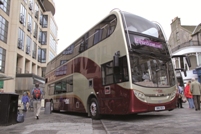
Grants for successful bidders can amount to up to 80% of the price differential between an LCV (Low Carbon Vehicle) and its diesel equivalent
The Scottish Government released £2m of funding in a second wave of Green Bus Fund grants on January 17.
The funding marks the latest round of applications for funding. It is intended to build on the previous success of the program, which saw five operators invest in 48 new low carbon buses.
The Scottish Green Bus Fund 2 will operate as a Challenge Fund, with the announced fixed budget available in the 2011-2012 financial year. Grants for successful bidders can amount to up to 80% of the price differential between an LCV (Low Carbon Vehicle) and its diesel equivalent. No more than £750,000 can be offered to any single bidder, though joint bids can be made for greater funding. The £750,000 limit also applies to all of an operators subsidiary companies.
Reacting to the news, Paul White, public affairs executive for CPT Scotland said: “While this is £2m going into the industry, there is so much more going out thanks to the BSOG cut. It’s money and we wouldn’t do anything other than welcome it, but it has only materialised because it’s coming up to the end of the financial year and leftover money needs to go somewhere to secure the same budget the following year.”
A spokesman for Alexander Dennis Limited (ADL) told CBW: “The Scottish government is clearly determined to build on the positive start it has made in terms of encouraging local authorities and bus operators to introduce low carbon bus options. Having won 46 of the 50 vehicles ordered in Round One of the Scottish Green Bus Fund – and now with nearly 350 ADL hybrid-electrics operating across the UK – we are in a strong position to further enhance our reputation as Europe’s leading supplier of this advanced technology.
“Our hybrids operating in Edinburgh are achieving nearly 60% fuel savings against the conventional diesels previously operating on the same route. Across the UK, the hybrids are achieving 96% and 97% reliability, on a par with diesels. In addition to this, we will shortly introduce stop-start technology to our current hybrid offering which should improve fuel efficiency and CO2 reductions by a further 10%.”
While the GBF 2 funding provides a useful stimulus for hybrid bus manufacturers, it also applies to any form of qualifying low carbon bus. This means full-electric drives, and alternatively-fuelled buses running on biofuels or sustainable biogas.
MAN’s EcoCity gas bus, which qualifies for the grant, is due to start trials in Edinburgh at the end of February and therefore unlikely to gain any firm commitment in this round of funding. Lothian Buses will trial the EcoCity until late April when it will move on to trials with McGills. General sales manager for MAN Truck & Bus, Tony Griffiths, is hoping to compete on better terms in any future funding rounds. He told CBW: “We aim to show we can offer a much more viable option which not only competes favourably in terms of reduced fuel use and emissions output, it also offers complete transparency in its whole life costs. We’ve been running these gas buses for over 10 years and so we can accurately predict and factor-in the cost of spare parts. There remains much scepticism over the predicted life of hybrid battery systems and the cost of replacement electric drive motors is said to be almost astronomical.”
For further information about the fund, call 0131 244 7760, email [email protected] or visit online here


